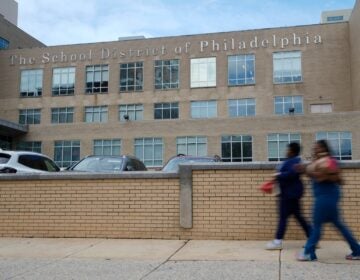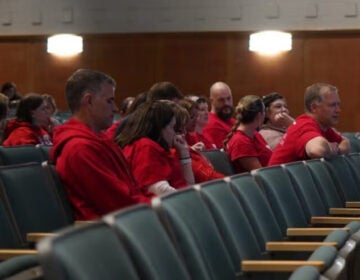Special-education caseloads at Philly high school exceed legal limits, pushing teachers to quit
ListenThis is a story about how the system crushes your soul.
Emotional-support teacher Danyell Dahn came to the Philadelphia school district four years ago from Bloomington, Indiana, eager to devote herself to the city’s most vulnerable students.
She arrived at Center City’s Ben Franklin High School with a mix of idealism and determination — certain that she could help kids overcome big problems by taking time to get to know them, talking honestly and building rapport.
“The thing that works best for my students is if they can make a connection with somebody that they can come to,” Dahn said, “and say, ‘I’m feeling really angry. I’m feeling really frustrated. What should I do?’ They need to be able to trust somebody.”
As an emotional-support special-education teacher, Danh, by definition, works with kids who have lawfully-binding individualized education plans — plans written with the intention that the students will get a great education that takes into account emotional or behavioral impediments to learning.
Students can have emotional support IEPs based on a variety of diagnoses — from schizophrenia to depression to a proclivity for unwarranted violent outbursts. Many consider being an emotional support teacher among the most challenging positions in the profession.
Dahn says many of the students she serves live in neighborhoods plagued with violence, and come to school “in survival mode…acting as if they are coming out of a war-zone.”
Helping these kids engage with school curricula first takes real human connection, she says.
“I need to be able to take time and say, ‘What happened?’ They need to know that I care, that I’m interested, that somebody’s listening,” she said. “And after they feel that they’re heard, then maybe they can hear what other people are saying, too.”
During her first year on the job, Dahn felt she was a steady, reassuring presence in her students lives. Her student caseload was under legal limits, and everything moved along relatively fine.
Then the budget ax fell.
And over the next few years, Dahn watched as caseloads ballooned and students received less and less individualized attention.
At the end of the 2012-2013 school year, the Philadelphia School District shuttered 24 schools and shed about 5,000 staffers. As a result, Ben Franklin, a school which received displaced students, saw enrollment rise by more than 250 students.
“When we hear about the school closings and the deficit, I don’t think people are realizing what that looks like, and that we’re making the problems worse,” Dahn said. “Unfortunately for the students there are a lot of needs that they have that we simply don’t have time to tend to during the day.”
At the beginning of this school year, there were five high-incidence special-education teachers at Ben Franklin for 164 special-ed students. Looking at state law, the teachers calculated that the school should have had at least three more teachers.
“Before the students even got there, you know we go in a couple of days early, and when I walked in, administration said, ‘We know, we know we have so many emotional support students. We are getting another teacher. The district knows. They’re sending somebody over.'”
Dahn waited.
September went by. October went by.
Nothing changed.
Chronicles of special education
Before Dahn came to Franklin, a private contractor, CATCH, supplied the school’s emotional support teachers. When CATCH ran the program, it staffed each classroom of fifteen kids with one special-ed teacher and two support staff assistants. These staffers stayed with the same kids all day, taught them all subjects. Three people for fifteen kids.
When Dahn came to the school in 2011-2012, she could have up to 20 kids on her caseload, but had the help of an assistant, and didn’t have to teach any classes on top of her caseload work.
By 2012-2013, Dahn had the same case-load limits, but also had to co-teach two classes and lead teach two classes of students above and beyond those on her caseload.
This year, with a “doomsday budget” in place, Dahn has had as many as 44 kids on her caseload and has had to lead-teach four classes and co-teach one class.
The prospect has made actually getting to know the students assigned to her close to impossible.
“How am I going to help facilitate them going out in the world and being successful,” she said, “if I don’t even know what they look like?”
The ratios were just as out of whack for Dahn’s high-incidence colleagues – each with caseloads about double the legal limit.
So in early December, Dahn and five other teachers filed a complaint with the district and the Pennsylvania department of education.
Staffing allotments were out of compliance with state law, the report said. Numerous district officials had been notified, but “still, the unfilled positions have not been advertised.”
Ben Franklin High School has been far from alone in its inadequate special-education offerings.
Sonja Kerr, director of disability rights at the Public Interest Law Center, has been hearing from parents, teachers and advocates about the abundance of special-education-related resource deficiencies that have cropped up across the district this year due to budget cuts and school closings.
“Prior to the closings last Spring, we wrote Dr. Hite and said, ‘So what’s going to happen with these kids with disabilities?’ And we got back a vanilla letter saying, ‘Everything will be fine.’ Well we know it’s not fine.”
Kerr says her group’s view of the current situation is simple: “The state of Pennsylvania as a whole is not adequately funding education as a whole.”
But the Philadelphia School District does not get a pass, Kerr added, because the funding well has dried up.
“The school district and the state are obligated to ensure that kids with disabilities receive appropriate services, and there’s nothing in the federal law — in the federal IDEA — that says, ‘P.S. Except we don’t have money this year.’ It’s not in there,” she said.
If the Philadelphia School District doesn’t have enough money to provide services, Kerr says, then it “needs to step up to the plate and say that to the governor, and say that publicly.”
Earlier this month, the district released Action Plan 2.0., which sets a lofty goal of 100-percent student graduation.
One of its strategies for achieving this goal is to “provide high quality special education services in the least restrictive learning environment.”
The Action Plan says that only 16-percent of district students with IEPs scored proficient or advanced on the PSSA in Reading, and only 18-percent scored proficient or advanced in Math.
(For comparison, in Maryland, 28 percent of 4th grade students with an IEP scored proficient or advanced in Reading. In Massachusetts, 21 percent of 4th grade students with an IEP scored proficient or advanced in Math).
In judging its progress since last year’s Action Plan 1.0, the district rated itself as having made “some progress” in regards to special-ed (this in contrast to “significant progress” or “no progress”).
Pennsylvania Governor Tom Corbett’s proposed budget would increase the state’s special-education subsidy by $20 million. For six years previous, the state’s contribution to special-ed funding had flat-lined. The state anticipates Philadelphia will get $3.5 million of this new increase.
Advocates consider this a step in the right direction, but by no means a full solution to the problem.
To teach or not to teach
By mid-January, the pressure on the staff at Ben Franklin reached its breaking point.
The district still hadn’t sent any more support, and fed up with the system, one of Dahn’s colleagues quit, leaving the staff even more shorthanded.
Dahn could relate, especially given what the district is demanding in concessions from the teachers union.
“At a time when I’m fully aware that my students are not getting what I should be giving them — what I want to give to them — and I’m being asked to do the job of two people, I’m at the same time being threatened by the district that I’m going to have a huge pay cut,” she said.
By month’s end, the state had interviewed teachers at the school as part of its investigation, but still, nothing had changed, and Dahn was at her wit’s end with frustration.
Day after day, Dahn trudged home from school, crushed under the weight of a system that seemed so profoundly blind to the needs of vulnerable kids that she felt “defeated,” a pawn in a game being played above her head.
“I feel overwhelmed, and like I’m the one who needs emotional support to be quite honest,” she said.
The never-ending flow of special-ed paperwork – in many cases for kids with whom she had barely interacted – made everything worse.
“I don’t know the kids, yet I’m still writing individualized education plans for them. It doesn’t feel right to me,” she said. “I feel like I’m functioning in a way that lacks integrity, and I’m not willing to do it.”
Light on the horizon?
Just this week, the school year more than half over, Dahn received some good news. The district hired a teacher to replace her colleague who quit in January. Also, based on her complaint, the state has ordered the district to hire enough teachers to be fully compliant with special-ed law by mid-march.
But here a distinction needs to be made. The teachers contend that the school needs a total of eight teachers for its 160 high-incidence special education students (an amount that fluctuates throughout the year). On top of the new teacher just hired, this would require hiring another three teachers.
But the state’s report says that the district only needs to hire 1.31 teachers.
What accounts for this difference? The state recommends that special-ed teachers currently assigned to only low-incidence students (those with rarer, more severe disabilities such as Down Syndrome) should take on more high-incidence students (those with more common, higher-functioning setbacks).
This sort of cross-assigning between high and low incidence is controversial among educators at Franklin.
Private-practice special-education attorney Josh Kershenbaum stresses that even if the district brings its staffing allotment into legal compliance, that won’t ensure that all special-ed students will get the attention they need.
“You might ‘fix’ the numerical discrepancy with the regulation, but this might or might not be appropriate in the case of specific students,” Kershenbaum said. “The numbers simply don’t tell enough of the story. As with just about every question related to special-education law, the answer is to examine the individual needs of the individual children. That is what the law requires.”
The district says it plans to come into compliance with the state’s findings by hiring a one additional full-time special-education teacher and one additional part-timer.
“We have the funds to be able to hire someone,” said district spokesman Fernando Gallard. “The money’s actually not the stumbling block here, what’s really the challenge is finding the right individual to meet the requirements of that position.”
Gallard said he didn’t know why the district didn’t advertise Franklin’s needed special-ed positions on its website.
In order to come into full compliance, the district must compensate Ben Franklin’s special-ed students for the hours during which inadequate caseload allotments left them under-served. The state department of education says it will “verify the corrective action prior to closing the complaint.”
Gallard said the district will notify the parents of students affected by the caseload deficiencies of the state’s report. “We’ll come up with a remediation plan,” he said, and put it into effect “as required by law.”
Goodbye, Philadelphia
Last week, the school district said it needed an additional $200 million just to keep staff and services at this year’s dismal levels.
For Dahn, the prospect of going through another year like this one is just too much.
“I’m resigning at the end of this year,” she said, with a laugh.
Dahn says she simply can’t stick around, and again put herself in a position to shortchange her students.
“Sometimes it feels to me like it’s more of a disservice to make a start at helping and then to not follow through. When I try to establish a relationship with a student,” she said, “I am trying to let them know that I am a trustworthy person and that they can come to me…if I can’t follow through with that, then I am another person in their life that betrayed their trust.”
Although she doesn’t have a set-in-stone job lined up, in order to restart her teaching career Dahn plans to move to the Pacific Northwest – about as far from the Philadelphia School District as she can go.
WHYY is your source for fact-based, in-depth journalism and information. As a nonprofit organization, we rely on financial support from readers like you. Please give today.





